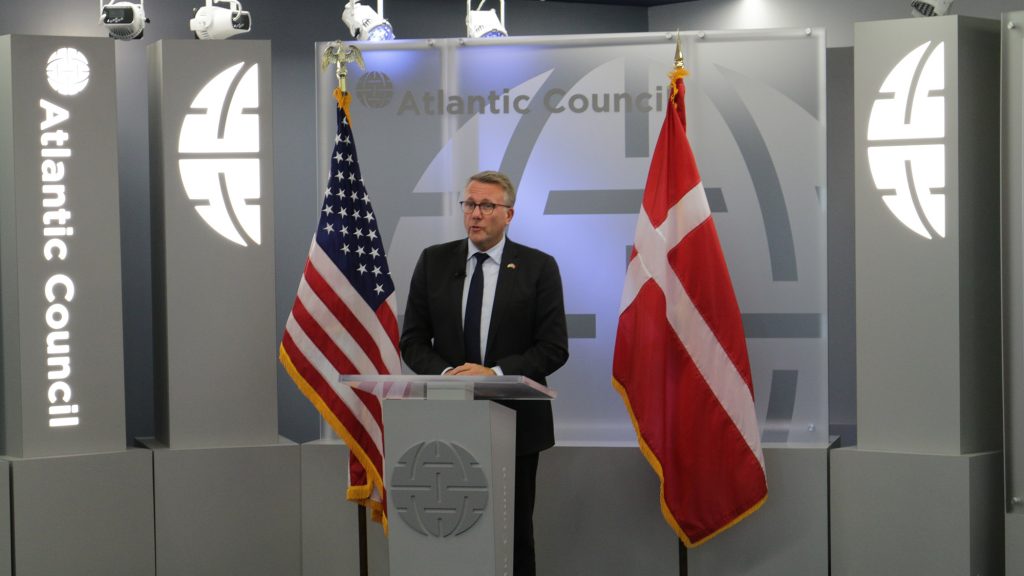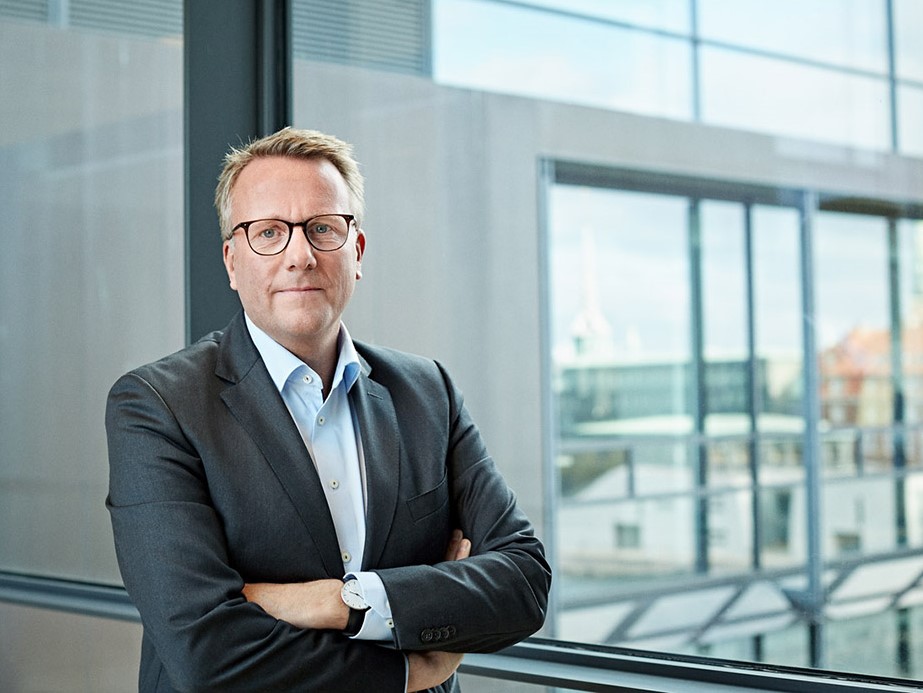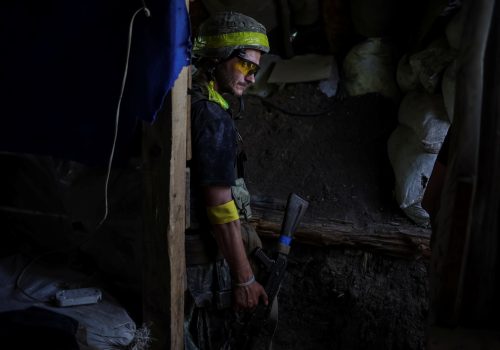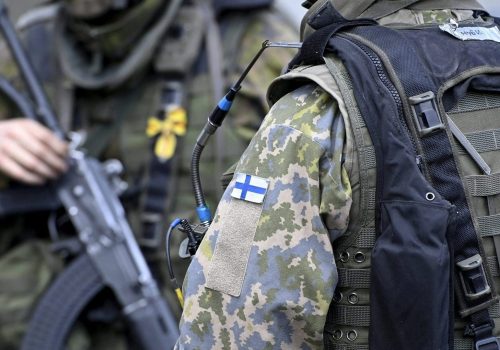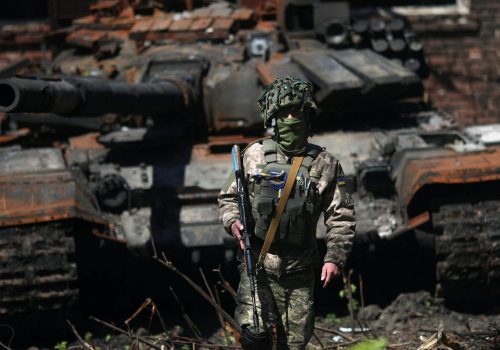Watch the full event
According to Danish Defense Minister Morten Bødskov, it’s time for what he considers to be phase three of the West’s strategy of supporting Ukraine, which should include weapons donations, military training, and demining—as well as giving “Ukrainians a [sense of] security of donations in the future.”
Speaking at an Atlantic Council Front Page event on Wednesday, Bødskov said the twenty-six countries that met at the Copenhagen Conference for Northern European Defense Allies last month kicked off this new phase of support when they pledged $1.5 billion in equipment, financing, and training to address Ukraine’s military needs now and well into the future.
Bødskov explained that the third phase of donations follows two previous phases: the first marked by countries contributing spontaneously and sporadically, and the second by a US-organized meeting at the Ramstein Air Base in Germany in April, which included countries that “coordinated directly to the needs of Ukrainians” at the time. The third phase, Bødskov said, will focus on getting Ukraine the assistance it needs to defend itself long term.
Bødskov warned that as a cold winter nears—one that may possibly dent European willingness to support Ukraine—it is “critical that we [Kyiv’s allies] maintain our stamina.”
“Denmark will keep working for support…” Bødskov said, “because Ukraine is fighting our fight.”
Below are more highlights from the event, moderated by Wall Street Journal reporter Vivian Salama, which touched on Denmark’s relationship with the United States, its role in NATO, and the country’s top priorities in Northern Europe.
The Putin problem
- Bødskov described Russian President Vladimir Putin’s perspective of Eastern Europe as one that paints the neighborhood “as a buffet where he can pick and choose” what to take. But that, Bødskov warned, is a “direct threat” to the values of democratic countries which chips away at peace, security, and prosperity. “We do not want to go back to the days of empire and military conquest…” he said. “We cannot go back, and we must not go back.”
- With Ukraine’s formidable defense against Russia’s invasion, it has become clear that Putin has “miscalculated,” Bødskov said. Despite Russia occupying some 20 percent of Ukrainian territory, Bødskov argued that Putin’s plans have backfired in other ways: for example, NATO enlargement with the pending addition of Sweden and Finland and the placement of “troops just outside his border.”
- In the long term, Bødskov expects countries to engage in “more activity towards the east” by bolstering Baltic countries that feel pressure from Moscow and countering Putin. Ultimately, Bødskov said, “there’s only one answer to him—and that’s unity, and strong unity.”
Denmark at the ready
- In supporting Ukraine, “it is crucial that… we in the West are ready to offer sacrifices,” Bødskov said, adding that “Denmark is ready to do our share.”
- He noted that in order to increase its global defense role, Denmark has committed to increasing its defense spending to reach 2 percent by 2033 and, through a national referendum, reversed its policy on abstaining from the European Union’s (EU) common-defense policy. “We are ready to take part,” Bødskov said.
- “Danish defense is going through a reformation or reorganization,” Bødskov explained, as the country is redirecting its focus to the Baltics and the High North, which has seen Russia increase defenses along its border. That focus will take the form of investments in capacities and capabilities “to react in faster ways towards the threats that we see from Putin,” Bødskov said.
New hands on deck
- With Finland and Sweden’s NATO memberships pending, Bødskov argued that these Nordic countries’ memberships will not only earn them greater security but also grant improved security to Denmark, NATO, and Europe.
- Beyond countering Putin’s ambitions, NATO’s enlargement is a long-term investment too, Bødskov explained, as “the Arctic will be an area of more tension in the future.” He added that with Sweden and Finland in NATO, Nordic countries “have the chance within NATO” to develop a defense policy specific to the region.
- And because of how integrated Sweden and Finland are with Denmark and other NATO countries—with Black Sea region facility training activities and exercises already set up—“a NATO membership for Sweden and [Finland] is more or less plug and play,” Bødskov said.
- As for Ukraine’s membership in the Alliance: While there’s a high entry bar that Ukraine has yet to meet, Bødskov reiterated that NATO maintains an open door policy (as does the EU). If Ukraine wants to get closer to NATO and the European Union, Bødskov said, “that’s their decision. I will welcome a… bigger Europe.”
US-Denmark cooperation at “a new level now”
- The Biden administration, Bødskov argued, has taken vital steps to support Ukraine, such as hosting the Ramstein meeting. Without them, “we wouldn’t be where we are now,” Bødskov said. And as Russia’s invasion of Ukraine has transformed the security environment across the continent, Bødskov said these moves are also “huge to Europe” in building security infrastructure and political will.
- “Strong US leadership is necessary if we are to prevail in the present fundamental conflict,” Bødskov said ahead of his meeting Thursday with US Secretary of Defense Lloyd Austin. “For generations, the United States has been Denmark’s most important ally,” Bødskov added. “We need to continue to stand close together—shoulder to shoulder.”
- Bødskov explained that the US-Denmark partnership is pivotal for tackling challenges “not only from Russia, but also from China.” And as the United States directs its gaze toward China and the Pacific, it would be “natural” for Washington to ask that Europe “take a bigger responsibility.”
Katherine Walla is an assistant director of editorial at the Atlantic Council.
Watch the full event
Further reading
Tue, Aug 23, 2022
Six months, twenty-three lessons: What the world has learned from Russia’s war in Ukraine
New Atlanticist By
Our experts break down how this conflict has transformed not only military operations and strategy, but also diplomacy, intelligence, national security, energy security, economic statecraft, and much more.
Mon, Aug 22, 2022
Sweden and Finland are on their way to NATO membership. Here’s what needs to happen next.
Issue Brief By John R. Deni
In response to Russia's unprovoked invasion of Ukraine, Finland and Sweden took the historic step of applying to join NATO. Both nations will bring modern capabilities that will help defend against malign actors. As Finland and Sweden's membership is forthcoming, Alliance leaders, NATO watchers, and transatlantic security experts need to consider how to fully integrate the new allies, include them in operational plans, and best enhance defense of a longer border with Russia.
Sun, Aug 21, 2022
What Ukraine needs to win the war
UkraineAlert By Richard D. Hooker, Jr.
Ukraine can win the war against Vladimir Putin's Russia and secure an extended peace in Europe but victory depends on receiving Western support that goes well beyond the current level, writes Richard D. Hooker Jr.
Image: Morten Bødskov speaks at an Atlantic Council Front Page event on August 31, 2022. Photo via the Atlantic Council.
